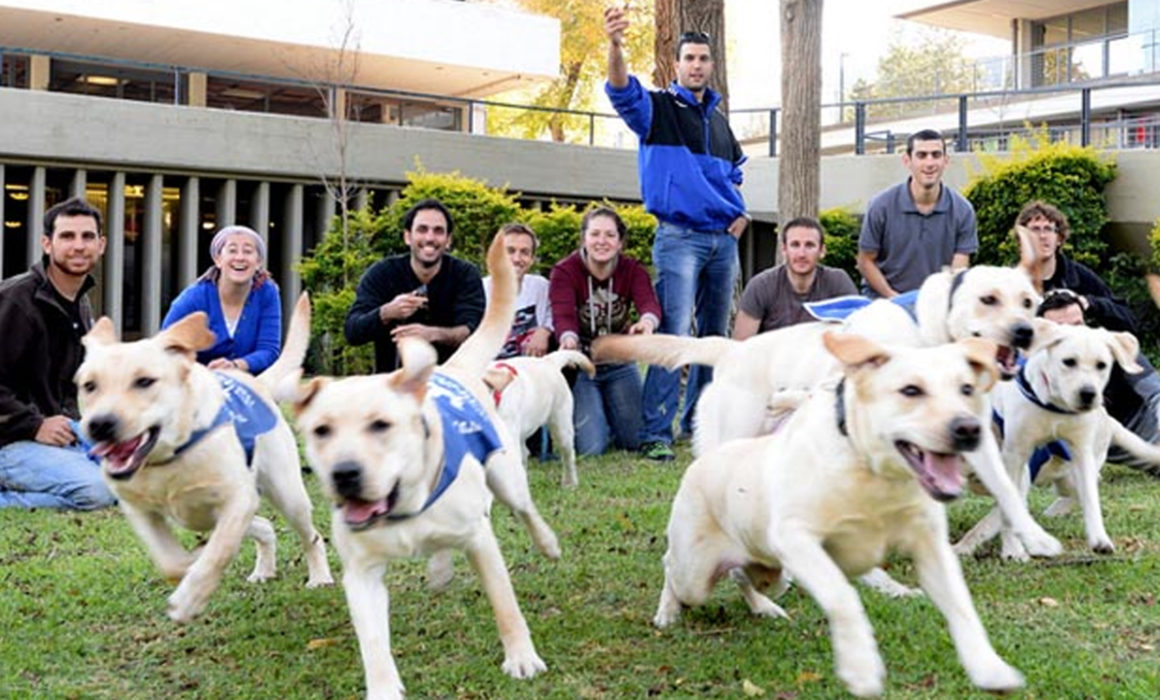Put yourself in the shoes of a busy college student — preoccupied with academics, extracurriculars, a social life, and coming into your own as a young adult. Then, imagine bringing an untrained puppy literally everywhere you go. Whether you are walking around campus, riding the bus, attending class, studying at the library, working at a student job to help pay off your loans, or trying to relax in your dorm, the responsibility is inescapable. The puppy comes with you everywhere. Nevertheless, you persist with training the puppy for more than a year.
This is the responsibility that 20 students at the Technion sign up for every year, as part of a program to adopt and train guide dogs for the blind. The students receive instructions on how to train guide dog puppies at home, on the street, and in crowded public areas. The training lasts for a year and a half and the students invest countless hours, and yet they stay focused on their ultimate goal: providing greater independence to blind individuals in society.
Perhaps what’s most remarkable about this program is how unremarkable it is for the Technion, where the spirit of Tikkun Olam — a commitment to making the world a better place — animates virtually every student, professor, program, and initiative.
As we marked the milestone of Israel’s 70th Independence Day this month, I found myself thinking about this giving spirit, which is at the heart of the Jewish state’s history. This story is told powerfully by author Avi Jorisch in his recent book “Thou Shalt Innovate: How Israeli Ingenuity Repairs the World,” which uncovers how tiny Israel has had an outsized impact globally through a selfless approach, aspiring to a purpose that is larger than itself.
Selflessness is intimately woven into the fabric of Israel, which has fought for survival every day for its 70 years of existence — and responds to this challenge not through self-pity, but instead by empathizing with countries and people in need worldwide and assuming the crucial responsibility of repairing the world.
Rather than using its ingenuity exclusively to solve its own crises and to improve life for its own citizens, who face well-documented challenges, Israel plays a disproportionate role in helping solve some of the world’s greatest problems. When there is a devastating earthquake in Nepal or Mexico, a hurricane in Puerto Rico or Houston, or any other major natural disaster, Israeli first-responders are always among the first international aid workers on the scene — from thousands of miles away, even as turmoil rages in the Jewish state and the Middle East. With the drip irrigation, reclamation and desalination technology it developed to solve its own water shortages, Israel helps California tackle its droughts. Israeli solar energy is literally a light unto the nations in Africa, bringing power to hundreds of rural villages that are off the grid.
Israel’s game-changing innovations are born at the university level through research and cultivating future leaders, and the Technion is leading the revolution. The Technion has pioneered a unique educational model that runs on a parallel track to its home country’s rising global influence. Through an interdisciplinary research approach and the operation of cutting-edge research centers, the Technion supports the people, ideas, and inventions that make immeasurable contributions to Israel and the world through life-saving medicine, sustainable energy, computer science, water conservation, space, nanotechnology, and more.
Just like Israel, the Technion is selfless and does not confine ingenuity to its own boundaries. Through expansive overseas partnerships, the Technion shares and exports its innovation. The Jacobs Technion-Cornell Institute at Cornell Tech in New York City combines the Technion’s professors, research, and resources and entrepreneurial know-how with Cornell University’s renowned reputation in engineering and computer science. This partnership results in groundbreaking academic programs such as the Technion–Cornell dual master’s degree in Health Tech, which teaches students to create applications to promote healthier living. The Guangdong Technion Israel Institute of Technology, meanwhile, trains an elite group of scientists and engineers who are working together to create solutions for the pressing environmental challenges faced by China and the world as a whole. Such efforts are not about financial gain. They are about improving lives.
From New York to Israel to China and many places in between, the Technion is bursting with ideas and activities that support a better world.
So, next time you observe someone relying on a seeing eye dog to enjoy the spring weather, to cross a street to the bakery, or to attend a concert, think of the Technion, and think of Israel. Think of our commitment to continue this momentum for the next 70 years — and beyond.
